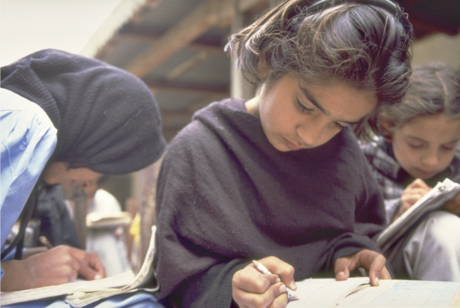1. Millennium Development Goals (MDGs)
The MDGs are common development goals shared by the whole international community in assisting developing countries. These goals were developed based on the United Nations (UN) Millennium Declaration adopted at the UN Millennium Summit held in September 2000 and other international goals. The MDGs set forth eight goals to be achieved by 2015, including the eradication of extreme poverty and hunger. These goals include 21 targets and 60 indicators.
By introducing simple, clear and time-bound targets, the MDGs have been playing an important role as a “compass” for development activities. The MDGs have already produced some positive results, such as meeting the targets regarding halving the proportion of people whose income is less than US $1.25 a day and ensuring access to safe drinking water. However, a number of targets are considered difficult to achieve by 2015. For example, achieving universal access to primary education, improving of maternal health, promoting gender equality and empowering women are considered difficult to achieve in many regions by 2015.


Promising bright future for children (Photo: Masako Imaoka / JICA)
2. Post-2015 Development Agenda
In addition to strengthening accelerating the efforts to achieve the MDGs, the international community has also commenced full-fledged discussions on the creation of international development goals beyond 2015.
Japan has been leading discussions in order to ensure that the new framework will be able to efficiently address the various challenges. In 2011, Japan established the Contact Group on the post-2015 development agenda in order to facilitate informal exchange of opinions among the concerned countries and organizations. The group had held a total of five meetings as of the end of 2012. Furthermore, in July 2012 the High-Level Panel of Eminent Persons on the Post-2015 Development Agenda, which is an independent advisory group of the UN Secretary General Ban Ki-Moon, was launched. The discussions held at the Contact Group were shared with the High-Level Panel at the side event of the UN General Assembly held in September 2020, with the aim of facilitating dialogue between High Level Panel members and other stakeholders.
3. Major Challenges
Japan has been leading discussions on formulating the post 2015 development agendas to ensure that they will be appropriate for the new era, focusing on the major challenges as follows.
- Focus on poverty eradication and develop ambitious goals based on the current MDGs.
- Shed light on growth and employment to create wealth which is the driving force for development, and create employment opportunities for various social classes to ensure that whole societies can enjoy the fruits of growth.
- Based on the fact that approximately three quarters of the world’s extreme poor live in middle-income countries, the focus should be placed on overcoming domestic disparities, and regional and social inequalities within a country.
- Address the emerging changes within the international community in the past decade, by coping with new important issues for sustainable development (disaster risk reduction, food security and nutrition), as well as promoting partnerships with the private sector, emerging countries and Non-governmental organizations (NGOs).
- Encourage efforts by the developing countries themselves (taking ownership) to improve development effectiveness.In order to address the nexus among various challenges, it is beneficial to take a human security approach, which focuses on every individual and promotes the protection and empowerment of each person. Japan is determined to continue its efforts in creating the post-2015 development agendas based upon the principles of human security.
